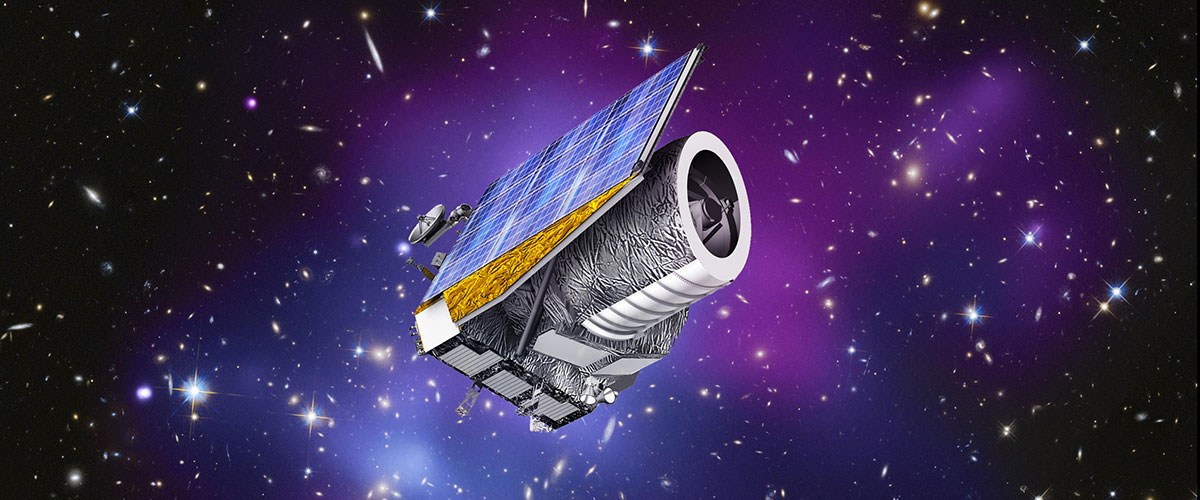Euclid: Understanding dark energy and our expanding universe
- Launch:
One of the greatest mysteries of astronomy is why the universe is expanding at an accelerating rate. Astronomers understand that there must be some force causing the expansion. They have called this mysterious force "dark energy."
Astronomers want to understand the nature of dark energy, and they hope that the Euclid astronomy mission will help them do just that. Euclid is a ESA space telescope that gives researchers the information they need to map out the large-scale structure of the universe with greater accuracy than ever before.
By mapping up to 2 billion galaxies, and peering 10 billion light-years back into the universe's history, astronomers are trying to see how dark energy and dark matter affected and continues to influence the growth and structure of the universe.
Euclid is a 1.2-metre diameter telescope that houses two scientific instruments: a visible-wavelength camera and a near-infrared camera/spectrometer. These instruments measure the "redshift" of galaxies. Redshift allows astronomers to determine how much the light emitted by an object is stretched, or shifted toward the red part of the light spectrum as the object moves away from us. This data enables a calculation of the rate of expansion of the universe.
Objectives
The Euclid mission aims to:
- Measure the shapes of galaxies at varying distances from Earth
- Use data to accurately measure the acceleration of the universe
- Better understand dark energy and dark matter
Canada's role in the mission

Dr. Will Percival, professor and Distinguished Research Chair in Astrophysics at the University of Waterloo. (Credit: University of Waterloo)

Dr. Mike Hudson, professor of astronomy at the University of Waterloo. (Credit: University of Waterloo)

Dr. Douglas Scott, professor of astronomy and astrophysics at the University of British Columbia. (Credit: University of British Columbia)

Dr. Tyrone Woods, assistant professor in the Department of Physics and Astronomy at the University of Manitoba. (Credit: Tyrone Woods)
The Canadian Space Agency is funding four scientists' participation in the Euclid mission:
- Dr. Will Percival, who holds Distinguished Research Chair in Astrophysics at the University of Waterloo, is using advanced statistical techniques to analyse the 3D pattern of galaxies in the universe, finding a "standard ruler" that can be used to measure the expansion of the universe. Dr. Percival's team uses Euclid data to build their maps and understand why the expansion is accelerating at present day. "We will be able to understand the physics driving this acceleration. While this has a name, dark energy, the processes behind it are not presently understood," he says.
- Dr. Mike Hudson, professor of astronomy at the University of Waterloo, is a researcher in observational and theoretical cosmology. He studies galaxy formation in order to better understand and measure the properties of dark matter and dark energy. The Euclid space mission measures the distortion of the shapes of distant galaxies caused by gravitational lensing, the influence of gravitational fields that can bend light. He and his team use Euclid data to study this shape-bending effect around galaxies and compare it with predictions made using their computer simulations.
- Dr. Douglas Scott, professor of astronomy and astrophysics at the University of British Columbia, studies cosmology, which examines the universe at the largest scales. The main science goal of the Euclid mission is to learn about the dark universe by using the bright universe, including how the matter in front of galaxies distorts light through gravitational lensing, and about particular signatures in how galaxies are clustered together, which together can tell us about the dark matter and dark energy that dominates the universe.
- Dr. Tyrone Woods is an assistant professor at the University of Manitoba. His research is focussed on the physics of some of the most extreme objects and most energetic events in the universe. Dr. Woods' team will be using Euclid data to probe the formation and growth of supermassive black holes, trace the evolution of galaxies, and understand the connections between the two over the history of the universe.

